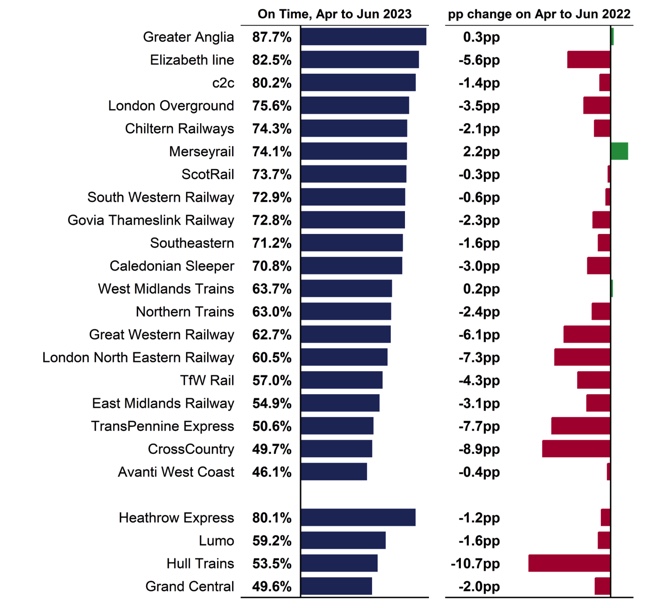Nearly every London train service now less punctual than last year

Nearly every train service in London is now less punctual than last year, according to industry watchdog the ORR, amid a national decline in performance at the majority of rail operators.
Strike disruption and performance issues at the sector’s infrastructure manager Network Rail resulted in less than three quarters of trains arriving on time across the country in the three months between April and June.
The latest quarter saw the number of train delay minutes attributed to Network Rail increase by 28 per cent year-on-year, while delay minutes attributed to operators jumped 22 per cent, the ORR said.
Only three operators saw improvements in punctuality from 2022, a year pummelled by industrial action and financial issues as the sector limped to recovery post-pandemic.
Almost every London service saw a decline in punctuality, with Govia Thameslink (GTR) down 2.3 percentage points, London North Eastern Railway (LNER) down over seven percentage points and Great Western Railway (GWR) down 6.1 percentage points.
Greater Anglia, which runs routes into Liverpool Street, saw a slight increase in punctuality, rising 0.2 and 0.3 percentage points respectively.
Michael Roberts, chief executive of London Travelwatch, the transport watchdog for the capital, said: “It’s incredibly disappointing to see that train services have become less reliable over the past year. Nearly every train operator serving London has got worse in terms of punctuality.
“If we want to encourage more people back to using rail then we need to see a concerted effort by industry to improve performance.
“Passengers will rightly expect to see these improvements on the ground sooner rather than later.”

The ORR said that, as passenger numbers have returned since the pandemic, both “reliability and punctuality deteriorated”.
It comes after a year marred by strikes from the RMT and ASLEF Unions, with no end currently in sight as both sides refuse to come to the table.
Five days of walkouts over the three months caused a more than half dip in the number of trains running nationally, the ORR said.
Delays and cancellations were amplified by five other “severely disrupted days”, which included Waterloo Station’s major signalling failure in April and another signalling fault at St Pancras International in June, which collectively resulted in over 1,000 cancellations.
A spokesperson from the Rail Delivery Group (RDG), which represents UK train operators, said: “The Rail industry is working hard to ensure that train services are reliable and punctual for passengers. This includes significant investment to improve infrastructure and rolling stock reliability.
“The period in question included five days of industrial action which caused disruption to services both on strikes days and on the days either side of them.
“Train operators have made every effort to maintain as many services as possible, but cancellations or delays also can occur due to various factors, including hot weather, infrastructure issues such as track or signalling faults, train faults and external incidents such as trespass.”
Glynn Barton, TfL’s chief operating officer, said: “We’re proud that the Elizabeth line and London Overground are two of the top four operators nationally in terms of on time services between April and June this year.”
“Although this is slightly lower than the same period in 2022, we moved from TfL Rail and opened the Elizabeth line in May 2022 and are pleased that we have been able to increase the services on both networks over the past year at a time when other rail companies have reduced their timetables.”